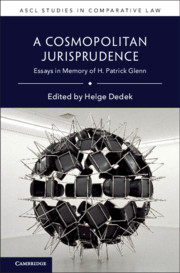Book contents
- A Cosmopolitan Jurisprudence
- ASCL Studies in Comparative Law
- A Cosmopolitan Jurisprudence
- Copyright page
- Epigraph
- Contents
- Foreword
- Acknowledgements
- Notes on Contributors
- Images
- Introduction
- Part I The Tradition of Comparative Law
- 1 How to Do Comparative Law: Some Lessons to Be Learned
- 2 The ‘Comparative Method’ at the Roots of Comparative Law
- 3 The Value of Micro-Comparison
- 4 Sociocultural Challenges for Comparative Legal Studies in Mixed Legal Systems
- 5 Breaking Barriers in Comparative Law
- Part II The Concept of Tradition
- Part III Crossing Boundaries
- H Patrick Glenn Publications
- Index
3 - The Value of Micro-Comparison
from Part I - The Tradition of Comparative Law
Published online by Cambridge University Press: 10 December 2021
- A Cosmopolitan Jurisprudence
- ASCL Studies in Comparative Law
- A Cosmopolitan Jurisprudence
- Copyright page
- Epigraph
- Contents
- Foreword
- Acknowledgements
- Notes on Contributors
- Images
- Introduction
- Part I The Tradition of Comparative Law
- 1 How to Do Comparative Law: Some Lessons to Be Learned
- 2 The ‘Comparative Method’ at the Roots of Comparative Law
- 3 The Value of Micro-Comparison
- 4 Sociocultural Challenges for Comparative Legal Studies in Mixed Legal Systems
- 5 Breaking Barriers in Comparative Law
- Part II The Concept of Tradition
- Part III Crossing Boundaries
- H Patrick Glenn Publications
- Index
Summary
Much of Patrick Glenn’s contribution to comparative law took the form of macro-comparison. William Twining has offered important criticisms of the undue attention to micro-comparison in the Western comparative law tradition. He has encouraged the enterprise of constructing macro pictures of law in the world. Glenn’s work, especially Legal Traditions of the World, shows how macro-comparison can illustrate the way different legal traditions can operate in combinations and across national borders. This challenges the compartmentalized view of legal systems adopted by bodies like the World Bank. Glenn combines understanding of social culture and ideology with history and geography in his picture of law. All the same, micro-comparison has a significant contribution. Micro-comparison helps us to understand how legal systems really work. The robustness of macro-comparative analyses depends on their ability to be verified in the close examination of specific instances of legal systems that they are supposed to explain. Macro-comparison is typically an exercise of seeing patterns in specific instances and developing a theory that continues on that pattern. For most scholars, micro-comparison ensures feet are on the ground and the tools are the comparative trade are well honed before embarking on the macro-comparative enterprise.
Keywords
- Type
- Chapter
- Information
- A Cosmopolitan JurisprudenceEssays in Memory of H. Patrick Glenn, pp. 64 - 82Publisher: Cambridge University PressPrint publication year: 2021

